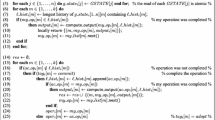Abstract
The adaptive renaming problem consists in designing an algorithm that allows p processes (in a set of n processes) to obtain new names despite asynchrony and process crashes, in such a way that the size of the new renaming space M be as small as possible. It has been shown that M=2p–1 is a lower bound for that problem in asynchronous atomic read/write register systems.
This paper is an attempt to circumvent that lower bound. To that end, considering first that the system is provided with a k-set object, the paper presents a surprisingly simple adaptive M-renaming wait-free algorithm where \(M=2p-\lceil\frac{p}{k}\rceil\). To attain this goal, the paper visits what we call Gafni’s reduction land, namely, a set of reductions from one object to another object as advocated and investigated by Gafni. Then, the paper shows how a k-set object can be implemented from a leader oracle (failure detector) of a class denoted Ωk. To our knowledge, this is the first time that the failure detector approach is investigated to circumvent the M=2p–1 lower bound associated with the adaptive renaming problem. In that sense, the paper establishes a connection between renaming and failure detectors.
Preview
Unable to display preview. Download preview PDF.
Similar content being viewed by others
References
Afek, Y., Attiya, H., Dolev, D., Gafni, E., Merritt, M., Shavit, N.: Atomic Snapshots of Shared Memory. Journal of the ACM 40(4), 873–890 (1993)
Afek, Y., Merritt, M.: Fast, Wait-Free (2k − 1)-Renaming. In: Proc. 18th ACM Symp. on Principles of Dist. Comp (PODC 1999), pp. 105–112. ACM Press, New York (1999)
Attiya, H., Bar-Noy, A., Dolev, D., Peleg, D., Reischuk, R.: Renaming in an Asynchronous Environment. Journal of the ACM 37(3), 524–548 (1990)
Attiya, H., Fouren, A.: Polynomial and Adaptive Long-Lived (2k - 1)-Renaming. In: Herlihy, M.P. (ed.) DISC 2000. LNCS, vol. 1914, pp. 149–163. Springer, Heidelberg (2000)
Attiya, H., Welch, J.: Distributed Computing: Fundamentals, Simulations and Advanced Topics, 2nd edn., 414 pages. Wiley-Interscience, Chichester (2004)
Borowsky, E., Gafni, E.: Immediate Atomic Snapshots and Fast Renaming. In: Proc. 12th ACM Symp. on Principles of Distr. Comp. (PODC 1993), pp. 41–51 (1993)
Borowsky, E., Gafni, E.: Generalized FLP Impossibility Results for t-Resilient Asynchronous Computations. In: Proc. 25th ACM STOC, pp. 91–100 (1993)
Chandra, T., Hadzilacos, V., Toueg, S.: The Weakest Failure Detector for Solving Consensus. Journal of the ACM 43(4), 685–722 (1996)
Gafni, E.: Read/Write Reductions. In: Guerraoui, R. (ed.) DISC 2004. LNCS, vol. 3274. Springer, Heidelberg (2004)
Gafni, E., Rajsbaum, S., Raynal, M., Travers, C.: The Committee Decision Problem. In: Correa, J.R., Hevia, A., Kiwi, M. (eds.) LATIN 2006. LNCS, vol. 3887, pp. 502–514. Springer, Heidelberg (2006)
Guerraoui, R., Raynal, M.: The Alpha of Asynchronous Consensus. The Computer Journal (to appear)
Herlihy, M.P.: Wait-Free Synchronization. ACM TOPLAS 13(1), 124–149 (1991)
Herlihy, M.P., Shavit, N.: The Topological Structure of Asynchronous Computability. Journal of the ACM 46(6), 858–923 (1999)
Lamport, L.: The Part-Time Parliament. ACM TOCS 16(2), 133–169 (1998)
Mostefaoui M., Raynal M., Travers C.: Exploring Gafni’s Reduction land: from Ωk to Wait-free adaptive (\(2p-\lceil\frac{p}{k}\rceil\))-renaming via k-set Agreement. Tech Report #1676, IRISA, Université de Rennes (France) (2006)
Neiger, G.: Failure Detectors and the Wait-Free Hierarchy. In: Proc. 14th Int’l ACM Symp. on Principles of Dist. Comp (PODC 1995), pp. 100–109. ACM Press, New York (1995)
Saks, M., Zaharoglou, F.: Wait-Free k-Set Agreement is Impossible: The Topology of Public Knowledge. SIAM Journal on Computing 29(5), 1449–1483 (2000)
Author information
Authors and Affiliations
Editor information
Editors and Affiliations
Rights and permissions
Copyright information
© 2006 Springer-Verlag Berlin Heidelberg
About this paper
Cite this paper
Mostefaoui, A., Raynal, M., Travers, C. (2006). Exploring Gafni’s Reduction Land: From Ωk to Wait-Free Adaptive \((2p-\lceil\frac{p}{k}\rceil)\)-Renaming Via k-Set Agreement. In: Dolev, S. (eds) Distributed Computing. DISC 2006. Lecture Notes in Computer Science, vol 4167. Springer, Berlin, Heidelberg. https://doi.org/10.1007/11864219_1
Download citation
DOI: https://doi.org/10.1007/11864219_1
Publisher Name: Springer, Berlin, Heidelberg
Print ISBN: 978-3-540-44624-8
Online ISBN: 978-3-540-44627-9
eBook Packages: Computer ScienceComputer Science (R0)




